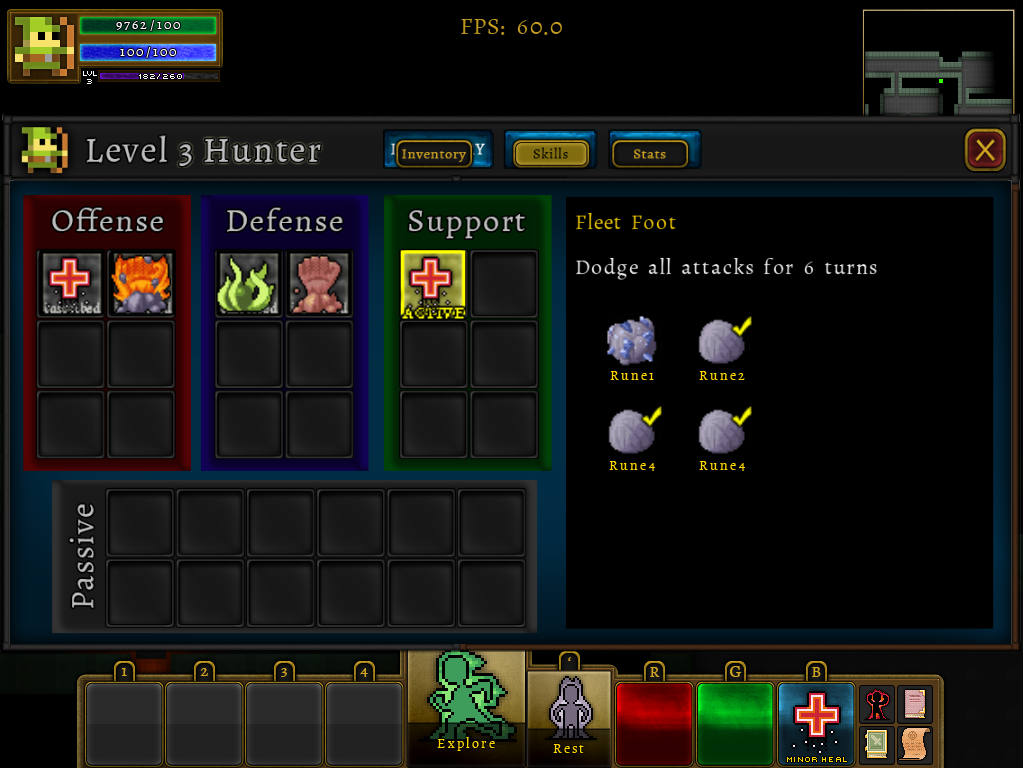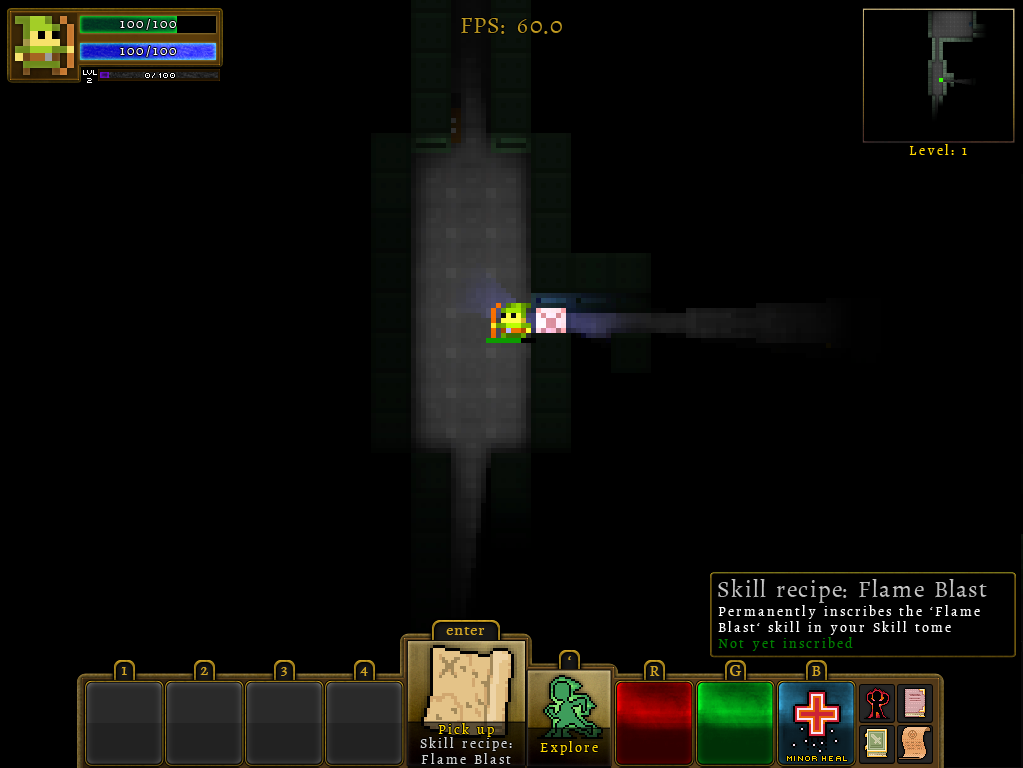One of the aspects that I most like in 'true' roguelikes is the permanence of death; it makes every move that much more important. Unfortunately, one of the things I hate most in roguelikes is the moment right after death. I've found myself gravitating towards games that find a balance between the two; when your character dies, they die - but you maintain some semblence of progression. Rogue Legacy is the game that most immediately comes to mind, but there are plenty of others
Persistence beyond death in 7yrl
In that vein, I want 7YRL to be replete with persistence-beyond-death themes. I've rationalized them through a series of "Tomes" that will be passed down from character to character (generic backstory pending). Here are some of the ways that knowledge will get passed down to benefit subsequent characters:
- Proficiencies - the more you use a weapon/armor/item, the better you get at using them. Higher bonuses, improved effects, maybe even unlocking new powers.
- Crafting items - When a player starts a new gameslot (e..g from nothing), the Dungeon is populated with only a bare minimum of weapon, armor, and item types. The player can increase the variety of objects by crafting them using Plans and Ingredients that they find and decipher. Once deciphered, the item can now appear in all subsequent games as drops.
- Professions - there will be 7 professions in the game which each have 10 levels that you can gain. Each level within each profession will provide a substantial, game-changing benefit (e.g. +100% gold drop; ability to add powers to items; double bag space in inventory; unlock alchemy & ability to craft potions; etc). Players will gain profession levels by crafting items; deciphering a plan will gain a profession point; gain enough profession points and you'll gain a level and the corresponding benefit.
- Skills - As the player plays, they can discover "Skill Recipes" - these recipes can be inscribed into the player's Skill Tome, and give the ability to learn powerful new abilities (offensive, defensive, and utility). These inscribed skills carry over from character to character - however, in order to learn the skill so that they can use it, each character has to find a set of Runes (specific to the skill) and use them to learn the skill. I have 120 skills mapped out and ready to implement; while every class can learn any skill, each class has 30 skills that are "theirs" and can be learned using the required runes - the other 90 skills (which belong to other classes) are harder for the player to learn and so require additional runes. This will make for some interesting mixing and matching...
- Augmenting items - Players can also use Runes to augment items. I haven't fully decided how best to do this yet, but the gist is that you can turn a common item (e.g. dagger) into a magic item (e.g. holy dagger) and these augmented items can then appear as random drops in subsequent games. This provides another min/max opportunity for the player; given a handful of Runes, you can learn a Skill that helps just that character, or augment a weapon that helps that character and all subsequent characters. Items can be augmented up to four times, from common to uncommon, to rare, to epic, and finally to legendary.
- Mob mastery - Killing a monster of specific type gives you an awareness of its weaknesses - e.g. a rat is susceptible to blunt damage (hammer = +25% damage) but is agile so takes less damage from large, sharp damage (sword = -25%). This knowledge is written in your Mob Tome so later characters gain it. The current character also get flat % bonuses the more you kill a specific type of mob (e.g. kill 10 rats, get +10% damage against them) - that flat bonus probably won't carry across characters.
Ultimately, the persistence of the above will make the earlier levels easier and get the player into later (less experienced) levels quicker, reducing the redundancy of those earlier levels.
Event/Action infrastructure rewritten
As I started implemented more complex Skills, I realized that the existing event/action infrastructure didn't provide enough granularity for targets, especially when I started getting into chaining events; e.g.
a player uses a skill (action)
which adds a celleffect (action)
which when entered (event) by an enemy of the player,
adds a buff (action) to the mob that entered the cell
which poisons the mob
But what if I wanted the buff to heal the player? ala:
a player uses a skill (action)
which adds a celleffect (action)
which when entered (event) by an enemy of the player,
adds a buff (action) to the mob that entered the cell
which heals the player
... or cast it when a friend of the player enters the cell?
a player uses a skill (action)
which adds a celleffect (action)
which when entered (event) by a friend of the player,
adds a buff (action) to the mob that entered the cell
which heals the player
... etc. This can chain farther along; at any point, the event or action can target one of a variety of different targets in the event chain. I implemented this by specifying the Trigger/Target in the Skill definition. e.g. the following:
it's complex, but it says:
[this line is implicit since it's coming from skillDefn] - when a player uses a skill
Apply a CellEffect to a Cell that the player selects which adds an adornment and
when an enemy of the mob that used the skill (ie the player) enters the cell
apply a celleffect centered around that enemy mob which adds an adornment to random cells and
when those cells are entered by friends of the mob that used the skill (the player)
heal the mob that entered
Put in English: this is the "healTrap" skill; it places a trap that when a mob steps on it, sprays healing globes all around which the player can pick up.
Almost any part of that can be changed, allowing me to quickly and easily create new skills. Item powers (e.g. healing potion, renew potion, magic weapon) work exactly the same way.
This required a complete rewrite of the Event/Action system; it's much better now, but was a ton of effort to do. Glad it's done!
Skills implemented
Once the Event/Action code was rewritten, I implemented the infrastructure that allows for skills to be inscribed (persisting between characters), learned (enabling it for the current character) and activated (allowing the player to chose between learned skills). Skills are categorized as Offensive, Defensive, Utility, and Passive - a character can have only one of each type active at a time.
Here's what the (obviously interim) UI for the skill pane looks like:
Here, the player has inscribed 5 skills (these skills remain inscribed for all subsequent players), has one active skill, and has 3 of the 4 runes necessary to Learn the inscribed 'Fleet Foot' skill. Once the player finds that last rune, they can Learn and Activate the skill, and it can appear in the R/G/B slots at the bottom of the screen.
Here's the list of skills that I've implemented so far - while these were mostly just test-bed skills, I suspect most will make it into the final product:
- Minor Heal: Heals self for a small amount
- Heal: Heals self for 50 HP
- Renew: Heals for a small amount over time
- Renew (passive): Grants 1HP every turn
- Heal Trap: Places a trap that when an enemy mob steps on it, sprays healing globes
- Poison Dart: Shoots a poison dart at an enemy
- Poison Cloud: Casts a poison cloud around the caster
- Flame Path: Leaves a trail of destruction behind you
- Immobilize Group: Immobilizes mobs in an area for 5 turns
- Flame Blast: Blasts an area which burns enemies for 10 turns
- Fleet Foot: Dodge all attacks for 6 turns
- Stoneskin: Reduces damage taken by 75% for 10 turns
- Stonefist: Increases damage dealt 2.5x for 10 turns
- Immobilize: Immobilizes a foe for 10 turns
Here's what a player sees when they discover a Skill Recipe:
All in all, I'm quite happy with how flexible the skill infrastructure worked out to be, and am looking forward to using it to create a wide variety of different skill types once the infrastructure work is all complete.





You've put a huge amount of thought into how to balance the roguelike nature of dying and losing the character whilst making progress at the same time. It sounds like you've got a great balance and I will look forward to seeing more about the game.
Thanks! I'm looking forward to spinning up more of the progression systems and seeing how the interplay between them all works. Originally I wanted to have every progression be impactful since those are more fun, like finding a legendary in Diablo - e.g. not "+5% damage" but rather "+50% damage". But working through the math, you end up with a system that can go out of whack very quickly, where the difficulty ramps too quickly between levels early on (so that it's still challenging later). Kind of like a spring simulation which goes haywire. There's a balance in there somewhere, but I suspect this'll involve a lot of testing and balancing. Luckily I've got 7 years to get it right ;)